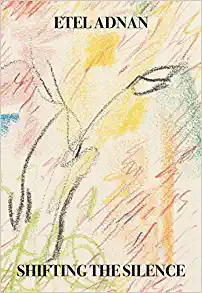Shifting the Silence
Shifting the Silence, by Etel Adnan.
Nightboat Books, 2020,
88 pages, paper, $15.95,
ISBN: 978–1–64362–030–5
Shifting the Silence begins with a one–word affirmation: “Yes,” writes Adnan. “Yes. The shifting, after the return of the tide, and my own.” We are, on the first page, immediately thrown into Adnan’s planetary mind. Her predilections with the cosmos, the tides, sound and silence, and, too, despair. Shifting the Silence is an intimate revelation of a mind at work, wildly free and open to the forces of the world, ungirded, far seeing, and confronting its darkest corners and the approach of life’s end — her own, and that of “civilization as we know it.”
Etel Adnan was born in 1925 and raised in Beirut, Lebanon, her mother Greek and her father Syrian. She was educated in French schools and grew up speaking Greek and Arabic, studied philosophy at the Sorbonne, and later pursued post–graduate studies in philosophy at Berkeley and Harvard. Known as much for her paintings — austere horizons distilled in color, the affirming presence of geometry, the sun — as her writing, Adnan published more than twenty novels, books of poetry, and essays in her life, and she exhibited widely. Omar Berrada in Frieze magazine referred to Adnan’s as a “mind that knows no borders, geographical or disciplinary.” Shifting the Silence is a record of her struggle with the ultimate border, and her desire to both transcend and accept it. The book, written as she navigated the end of her life, is replete with ruminations and grief, but too with a vigorous joy for life.
Adnan’s oeuvre consistently reveals her faithful wrestling with the fullness of the world around her, and this book is no different. The writer moves from the most intimate expressions of personal feeling, through the political moment, to our presence in the universe; from the planetary, to what she calls “the sanity of the physical world.” In speaking of her life, she notes “I threw away my compass to the waves,” following uncharted roads and staying with confusion where it led:
We’re on a planet sustained by nothing, carried
through pure space by a willful star made of fire and in
constant ebullition. We’re travelers covering traveling
grounds. Going, always going.
Shifting the Silence reads partly as poetic journal and part stream–of–consciousness amalgam of a restless mind navigating longing, desire, sorrow, and endings. There are so many philosophical gems here, wisdom offered freely by an artist who has refused to be reduced by society’s restrictions or cowed by fear of death. Yet she offers frank acknowledgement of fear — and yearns for all the things she will not be able to do. In the book, her limitless mind realizes the body is now constrained with no place to go. In parallel, she reflects on visions of our fading planet — wildfires, wars, warming oceans, struggling fish, and the virus. But, she says, “We have to deal with hopelessness” and turns again to the vastness of the universe:
I consider the light that enters the room in the early
hours of the day as a messenger of the sun, a direct
voyager, a particle, a wave, who knows, but an object of
sorts that left its solar source, covered miles and landed
on my skin. So the universe constantly visits while
waiting for us to reverse that itinerary.
Friends visit and inspire Adnan’s thinking through conversation and camaraderie, a glass of wine. She continues to feel freedom in the “joy of frantic concepts.” She muses on the spiritual clarity of works of Malevich and how they inscribe themselves on our bodies; she concludes that Bach’s music is “a needle on the cosmic balance.” She turns again and again to the beauty in the world, and invites her reader to see the same: “There’s a dance of fireflies, little lights turning around the boats of the Bay, tiny creatures chanting, fish jumping — the feast of early summer subsiding in the heat, and lemonades!”
When Adnan asks “What’s left?” and “How many tomorrows to worry about?” she invites us to ask the same questions of ourselves, and our planetary life as we know it. Shifting the Silence propels us to consider our days and to look for joy too, to observe ourselves passionately in the world. Shifting the Silence, invites readers to dive into both what is spoken about and what is ignored, to be relentless in our curiosity about this experience of life and death.
Etal Adnan passed away in December 2021; in her 96 years, she witnessed and articulated vast global, political and environmental transformations with equanimity and grace. As she once told her partner Simone Fattal, “When I die, the universe will have lost its best friend, someone who loved it with a passion.” That loss is also ours.
— Julie Poitras Santos


